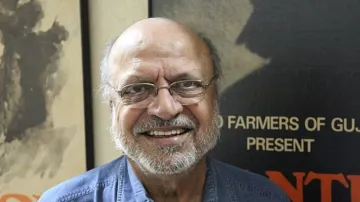Shyam Benegal dies: A visionary who shaped Indian new wave film movement with several masterpieces
Shyam Benegal dies: Known for his socially conscious storytelling, he tackled issues like gender inequality, class struggles, and the complexities of post-independence India, shaping generations of filmmakers and inspiring lasting change.

Shyam Benegal dies: Veteran filmmaker Shyam Benegal, one of the most influential pioneers of Indian parallel cinema, passed away at the age of 90 after a prolonged illness. The legendary director, who had just celebrated his 90th birthday on December 15 in a modest manner, left behind a profound legacy that transformed Indian cinema. Benegal’s contribution to filmmaking is unmatched, and his work continues to inspire filmmakers and audiences alike.
A Journey Rooted in Social and Political Issues
Born on December 14, 1934, in Hyderabad, Shyam Benegal began his journey into cinema with a deep-seated interest in the social and political issues of his time. He was the founding father of the parallel cinema movement in India, which gained momentum in the 1970s and 1980s, away from the bounds of mainstream Bollywood. His films carried a strong label of realism and social commentaries and showcased characters from marginal communities in society.
The Breakthrough: Ankur and Beyond
Before entering Bollywood, Benegal made his debut feature, Ankur (1973). The film was based on a rustic exploitation theme. It won accolades both at the box office and awards. His further films—Nishant (1975), Manthan (1976), and Bhumika (1977)—lip-synced Master Storyteller, the best consoles complex social issues with intensity and depth.
Exploring Ordinary Lives in Extraordinary Circumstances
The filmmaker’s work often revolved around the lives of ordinary people caught in extraordinary circumstances. Nishant focused on social injustice in a rural village, while Manthan, funded by the National Dairy Development Board, brought attention to rural empowerment and the struggles of farmers. Bhumika, a biographical film about a Marathi actress, highlighted the challenges faced by women in a male-dominated industry.
Historical Narratives and Biographical Stories
Benegal’s versatility extended to his portrayal of historical and biographical stories, as seen in Junoon (1978), a period drama set against the backdrop of the 1857 Indian Rebellion, and Mandi (1983), which satirized the exploitation of women in society.
Shaping Indian Television: Bharat Ek Khoj
In addition to his films, Benegal was also a key figure in Indian television. His 1988 series Bharat Ek Khoj, based on Jawaharlal Nehru’s Discovery of India, is considered one of Indian television’s finest works, bringing the country’s history to life for a new generation.
A Lifelong Mentor and Educator
Benegal, in fact, was a lifelong educator and mentor; he was not just the Chairman of the Film and Television Institute of India (FTII) at two different times, but also one who shaped the careers of many filmmakers. His contribution to Indian cinema extends far beyond his work as a director; he nurtured generations of filmmakers who have continued to build his legacy.
Accolades and Recognition
During his entire career span, Benegal has received many awards, including 18 National Film Awards, a Filmfare Award, and the prestigious Dadasaheb Phalke Award in 2005, which is the highest cinematic honour of India. His films were usually featured with hard-hitting social issues, realizations, and concerns that he very deeply utilized the medium to talk about such issues as class struggles, gender inequalities, and conflictions faced by post-independent India.
Television Works: Yatra and Samvidhaan
Neither big screen nor memorable feature films graced by mention, his works on television were Yatra and Samvidhaan, by which he brought his historical and political narration to the imagination of the public.
A Humble Legacy Beyond Awards
In life, Benegal has remained a humble and inner person. Even now, in the moment of very successful achievement, all these have been belittled and understood simply rather than frantically. All this while, his definition has always been craft-based rather than award-based. A powerful medium for social change, as is: Will be remembered as filmmaker challenging conventions, unknown stories, and leaving indelible marks on the art of storytelling